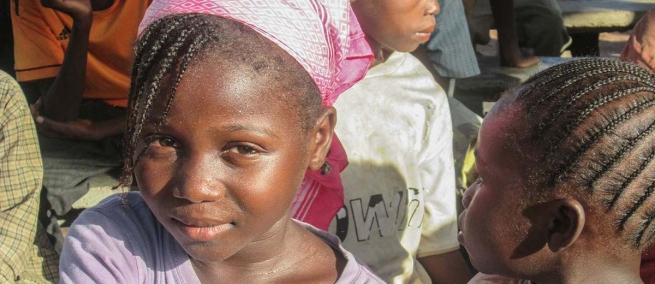CHAD: Programs for youth extend beyond schools

Salesian missionaries provide education and for the basic needs of youth in their programs
(MissionNewswire) Salesian missionaries have been living and working with poor youth in Chad in central Africa since 1995. They established their first programs in Sarh, the third largest city in the country, which has more than 120,000 residents. Three years later, missionaries began other programs in the capital of N’Djamena, and in 2013, in the city of Doba.
In Sarh, Salesian missionaries operate a kindergarten, a school for older youth, a youth center and a church parish. Salesian work also takes them into more than 116 villages in the surrounding areas. The goal is to provide people with their most basic needs including food, clothing, and medical assistance while encouraging youth to attend the local Salesian school.
Education has proven to be an effective means of breaking the cycle of poverty while giving the most vulnerable youth a sense of personal dignity and self-worth. Salesian primary and secondary schools lay a foundation for future education while Salesian vocational, technical, professional and agricultural schools provide practical skills so youth have an opportunity to become contributing adults in their communities — rebuilding communities and ending the cycle of poverty.
“Education is always our primary focus,” says Father Gus Baek, director of Salesian Missions, the U.S. development arm of the Salesians of Don Bosco. “We know, however, that youth in Chad are dealing with much more than just having access to education. Salesian programs are tailored to meet the needs of the youth in the communities they serve. Homeless and malnourished youth are simply not able to focus effectively on their studies while they struggle to meet their basic needs. Our services provide food and shelter so youth are able to focus on the education provided.”
Chad is one of the poorest countries in the world. According to the World Food Programme, 42 percent of its population lives below the poverty line. Chad is a low-income country with limited income-generating opportunities and restricted access to social services. The Human Development Index ranks it 187 out of 189 countries in 2020.
Most of Chad is covered by desert and this presents a significant challenge for a developing country that depends largely on subsistence farming. The most successful practice is migratory farming, where herds can move and adapt to changing climate conditions, but even this practice is severely limited by resources.
Frequent droughts have also aggravated already challenging conditions. Recent climate changes have decreased rainfalls and consistent overuse has led to soil erosion and land degradation. As a result, farmers lack infrastructure, support and resources needed to grow sufficient food to feed the country properly.
The World Food Programme has noted that there are 3 million vulnerable people affected by chronic food insecurity and climate-related disasters in 2022. In addition, 37.8 percent of children under age 5 suffer from stunting, according to the Global Nutrition Report, with low height for their age caused by chronic malnutrition.
Women in Chad also face significant gender discrimination. They often must work outside the home as well raise a family, tend the farms, gather water and cook. Yet they are culturally limited from access to education or training, and marginalized by society. These women are especially vulnerable to the psychological as well as physical effects of poverty.
###
Sources:
ANS Photo (usage permissions and guidelines must be requested from ANS)
ANS – Chad – Salesians in Doba, committed to ensuring children’s nutrition
Salesian Missions – Chad
World Food Programme – Chad





